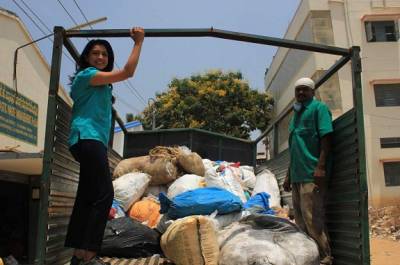BBC World News Horizons to explore advances in eco-living in China and India
In the tenth episode of the Horizons series, presenters Adam Shaw and Saima Mohsin visit Bangalore, India and Tianjin, China to see whether the need for urban expansion can be balanced with reducing the impact on natural resources and the environment.
In the next 20 years there are expected to be nearly two billion new city dwellers, with most of this growth taking place in the developing world.
In North East China, Adam Shaw travels to Tianjin Eco-City to visit what has been described as the world’s largest Eco-City development. A joint venture between the governments of China and Singapore but in partnership with private sector developers; the project covers 30 square kilometres of previously abandoned land and by 2020 is anticipated to become home to 350,000 people.
Adam meets Ho Tong Yen, Chief Executive of the Sino-Singapore Eco-city Investment & Development Company to find out aboutthe challenges involved in being commercially viable as well as green.
Ho Tong Yen said: “What we’re trying to do is to make sure what we do here can be done elsewhere. So we are aiming for 20% renewable energy, and we ensure the homes we build here are much greener than our usual business but not to the extent that cost rises beyond what the market can support.”
Later, Adam meets Richard Register, one of the world’s leading theorists in ecological urban planning and the man credited with coining the term ‘Eco-City.’ Adam and Richard discuss the problems of defining what the term ‘eco-city’ means and the importance of changing the way we look at urban development.
Saima Mohsin travels to Bangalore to visit two eco-friendly housing developments, which aim to be almost entirely independent from the civic infrastructure for water and electricity, using mainly renewable energy sources. At Zed Earth she talks to some of the residents to see how low carbon living is reducing their energy bills.
Saima also meets economist turned eco-entrepreneur Chandrashekar Hariharan, to discuss the issues facing India as the demand for new buildings grows.
Chandrashekar Hariharan, Chairman, BCIL – Biodiversity Conservation India Ltd said: “The building industry as well as the customer needs to see that every certified building will result in a 30% reduction in the use of energy post occupancy, around 20% in the course of construction of that building, a 50% reduction in the demand for fresh water in such a building. To me this is a sort of microcosm of the sort of cities that will happen in the next 15 years. That will have to happen. This is an imperative, these are not alternatives. You need to get at least 3% of the building industry to be doing what we’re doing then in 30 or maybe 40 years we will all get sustainable.”
Entertainment
MINUTES TO READ




















Share
Facebook
YouTube
Tweet
Twitter
LinkedIn